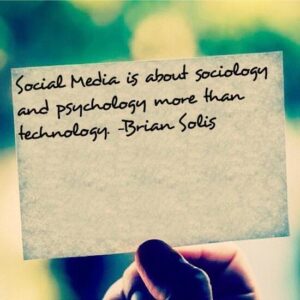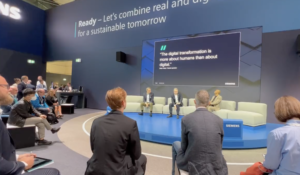
There’s a saying, “technology changes, people don’t.” Yet, when we consider the impact of technology on our daily lives, some very interesting observations surface…
A pen now feels awkward to hold and as such, our penmanship is deteriorating.
It’s now common to sit at a dinner table with family and friends where some are actively communicating with others, listening to music or gaming via mobile devices.
We are redefining the perception, boundaries and thresholds for privacy as we once knew it.
The future of the art of long form writing is at risk of becoming shrtr and less formal #forrealz.
For some, technology encourages immersion and introverted experiences in public settings, reducing the natural human dynamics of engagement. To counter, coffee shops and cafes are becoming “laptop and WIFI free.”
For others, social networking online is converting introverts into digital extroverts, rewarding participation with confidence boosting actions such as responses, “likes,” friend requests, shares, etc.
To connect with other human beings now in the future is not only changing, it’s evoking a sense of Digital Darwinism. The mantra of “Engage or Die!” was born to make the point that what was, what is, and what will be are no longer linked to all we know and instead, demand an expanded perspective.
Social networking is pervading led by the clicking, connecting, and sharing of hundreds of millions of Internet denizens around the world. While Facebook is the digital equivalent to your online residence, Twitter is reflective of the “me” in social media. Twitter is not a social network, it is a series of disparately connected personalities linked through friendship, admiration, education, and context. How we embrace and invest our persona in this paradigm says more about the future of digital culture and ourselves than we might imagine.
With the introduction of Apple’s new pseudo social network “Ping,” conversations lit up Twitter ultimately sparking a trending topic, “we don’t need another social network.” Indeed, there is a prevailing sense of social media fatigue (aka social network fatigue (SNF). But as good friend Sarah Lacy recently said, “If You’ve Got Social Media Fatigue, UR DOIN IT WRONG.”
At a recent Girls in Tech event hosted at KickLabs in San Francisco, Twitter co-founder Evan Williams inferred that Twitter is actually a “cure” for information overload. Williams likens Twitter to a recipient-driven medium where people who have something to say can now find and reach the right audience, “That’s a much better situation for both the publisher of the information and the consumer of it. So recipient-based media can scale better “in a world of infinite information.”
@Ev also discussed the future of relevance and how Tweets will adapt to your interests. He compared the experience to Google, “Google is very good at ‘I need to solve a problem, I need to buy something, I need an answer. Twitter is more ‘I’m interested in many things, I don’t know what I need to know.’ What we need to get much better at is scaling that system so you don’t have to pay attention to everything, but you don’t miss the stuff you care about.”
The State of the Evolving Egosystem
Over the years, measuring the impact of Twitter as a medium, proved difficult and elusive as details and numbers did not emanate from Twitter itself. Third-parties using APIs helped us paint the landscape to visualize the tremendous proliferation of what started as a microblog and later evolved into an intricate system for sharing, discovering, and voicing our inner monologue. To help, Williams posted details, stats, and direction to the Twitter blog. As a result, some very interesting usage patterns and adoption rates were revealed.
First, Twitter boasts over 145 million registered users. In April at its inaugural Chirp conference, Twitter announced 105 million users tweeting upwards of 65 million times a day. The number of active accounts however, remains unknown. As Twitter better explains its mission, purpose, and value system to everyday consumers, the number will only continue to grow.

Evan Williams also shared a glimpse of the Twitter ecosystem and how individuals connect to one another. If the “Web is Dead” Twitter users have yet to hear the news. Twitter.com and m.twitter.com account for 92% of all access and communication.
Social Science Will Reveal the Future of Social Networking
I believe that in order to truly understand technology, the internet, social media and its impact on society, business, and culture, social science becomes paramount.
Social science is the study of human society and social relationships and its role in the evolution of Twitter, social networking and the future of online societies is paramount. While we focus on the future, we must also look at the past and the present to find meaning, purpose, and insight to steer progress. This rapid evolution requires study in order to navigate change and define a course of action and the passage ways to what lies ahead.
As technology and the internet affect human behavior and culture, understanding how we got here will help us affect where we are going. The future of communication, relationships, and education is in your hands…and your status updates, tweets, “likes” and connections.
Connect with Brian Solis on Twitter, LinkedIn, Tumblr, Facebook
___
Please consider reading, Engage!: It will help you find answers to your questions…

___
Get Putting the Public Back in Public Relations and The Conversation Prism:


___
Image Credit: Shutterstock





Unfortunately, a lot of what @Ev said at that Girls in Tech event was complete and utter nonsense. Here’s why: http://marketingteaparty.com/2010/09/03/reactions-to-twitter-ceos-comments/
Unfortunately, a lot of what @Ev said at that Girls in Tech event was complete and utter nonsense. Here’s why: http://marketingteaparty.com/2010/09/03/reactions-to-twitter-ceos-comments/
As always, another thought provoking post from Brian. I have to completely agree that ” I believe that in order to truly understand technology, the internet, social media and its impact on society, business, and culture, social science becomes paramount.” In fact, I think that social science is paramount in all business environments because it relies so heavily on effective communication strategies.
Elise, thank you so much for the wonderful words. Well said!
You have a great talent for pulling together so many online conversations into one coherent post. I have been reading up on Ping, Twitter’s mobile app’s and the conversations surrounding the post “the web is dead” but I didn’t, until now, tie them together in my mind as having an underlying connection presented in the social sciences. I couldn’t agree more that the secret to the future lies in the past and present. Because of the haste of online social evolution, it’s easy to forget our grassroots. Thank you for the reminder.
Thank you Alexandra for reading and sharing your thoughts. We're all in this together!
Agreed! Thank you for helping us to expand our perspective.
Great article Brian, as always you are on point. Will you be at BlogWorld New Media Expo?
I just mentioned the fact to my postlady who brought me a package, that my signature over the past few digital years has deteriorated immensely. I used to have great handwriting, now it sucks. Sad, indeed.
Thanks, I totally agree with you. I'm into a debate with a culture editor, who says that “Facebook is composed only of people who want to boost his ego and talking nonsense,” We are both columnists in the same newspaper:) We will continue the debate …
Thanks, I totally agree with you. I'm into a debate with a culture editor, who says that “Facebook is composed only of people who want to boost his ego and talking nonsense,” We are both columnists in the same newspaper:) We will continue the debate …
i like that
I agree with your disagreement of the phrase, “Technology changes, people don't.” One of the things that I do not like about our changing culture that is becoming more and more technology driven is that it is becoming increasingly difficult to ever have a person's full attention. Perhaps one way of looking at this change is that it is giving introverted people a chance to put themselves out there since presenting themselves in person may be a dilema.
In this ever changing world, one cant tell what will be the next change but maybe the change too will be technological. Nice post.